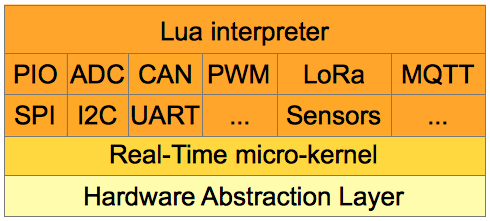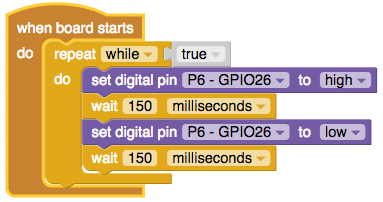Lua RTOS is a real-time operating system designed to run on embedded systems, with minimal requirements of FLASH and RAM memory. Currently Lua RTOS is available for ESP32, ESP8266 and PIC32MZ platforms, and can be easilly ported to other 32-bit platforms.
Lua RTOS has a 3-layer design:
- In the top layer there is a Lua 5.3.4 interpreter which offers to the programmer all the resources provided by the Lua programming language, plus special modules for access the hardware (PIO, ADC, I2C, RTC, etc …), and middleware services provided by Lua RTOS (Lua Threads, LoRa WAN, MQTT, …).
- In the middle layer there is a Real-Time micro-kernel, powered by FreeRTOS. This is the responsible for that things happen in the expected time.
- In the bottom layer there is a hardware abstraction layer, which talk directly with the platform hardware.
For porting Lua RTOS to other platforms is only necessary to write the code for the bottom layer, because the top and the middle layer are the same for all platforms.
The Lua RTOS compatible boards can be programmed in two ways: using the Lua programming language directly, or using a block-based programming language that translates blocks to Lua. No matter if you use Lua or blocks, both forms of programming are made from the same programming environment. The programmer can decide, for example, to made a fast prototype using blocks, then change to Lua, and finally back to blocks.
In our wiki you have more information about this.
-
Please note you need probably to download and install drivers for your board's USB-TO-SERIAL adapter for Windows and Mac OSX versions. The GNU/Linux version usually doesn't need any drivers. This drivers are required for connect to your board through a serial port connection.
Board WHITECAT ESP32 N1 ESP32 CORE ESP32 THING
-
Install esptool (the ESP32 flasher utility), following this instructions.
-
Get the precompiled binaries for your board:
Board WHITECAT ESP32 N1 ESP32 CORE ESP32 THING GENERIC -
Uncompress to your favorite folder:
unzip LuaRTOS.10.WHITECAT-ESP32-N1.1488209955.zip
-
Go to the uncompressed folder, and flash:
cd LuaRTOS.10.WHITECAT-ESP32-N1.1488209955
For flash the firmware:
python <esp-idf path>/components/esptool_py/esptool/esptool.py --chip esp32 --port "<usb path>" --baud 921600 --before "default_reset" --after "hard_reset" write_flash -z --flash_mode "dio" --flash_freq "40m" --flash_size detect 0x1000 bootloader.WHITECAT-ESP32-N1.bin 0x10000 lua_rtos.WHITECAT-ESP32-N1.bin 0x8000 partitions_singleapp.WHITECAT-ESP32-N1.bin
For flash the filesystem:
python <esp-idf path>/components/esptool_py/esptool/esptool.py --chip esp32 --port "<usb path>" --baud 921600 --before "default_reset" --after "hard_reset" write_flash -z --flash_mode "dio" --flash_freq "40m" --flash_size detect 0x180000 spiffs_image.WHITECAT-ESP32-N1.bin
Change "esp-idf path" and "usb path" according to your needs.
-
Install ESP32 toolchain for your desktop platform. Please, follow the instructions provided by ESPRESSIF:
-
Clone esp-idf repository from ESPRESSIF:
git clone --recursive https://github.com/espressif/esp-idf.git
-
Clone Lua RTOS repository:
git clone --recursive https://github.com/whitecatboard/Lua-RTOS-ESP32
-
Setup the build environment:
Go to Lua-RTOS-ESP32 folder:
cd Lua-RTOS-ESP32
Edit the env file and change HOST_PLATFORM, PATH, IDF_PATH, LIBRARY_PATH, PKG_CONFIG_PATH, CPATH for fit to your installation locations.
Now do:
source ./env
-
Set the default configuration for your board:
Board Run this command WHITECAT ESP32 N1 make SDKCONFIG_DEFAULTS=WHITECAT-ESP32-N1 defconfig ESP32 CORE make SDKCONFIG_DEFAULTS=ESP32-CORE-BOARD defconfig ESP32 THING make SDKCONFIG_DEFAULTS=ESP32-THING defconfig GENERIC make SDKCONFIG_DEFAULTS=GENERIC defconfig -
Change the default configuration:
You can change the default configuration doing:
make menuconfig
Remember to check the device name for your board's USB-TO-SERIAL adapter under the "Serial flasher config / Default serial port" category.
-
Compile:
Build Lua RTOS, and flash it to your ESP32 board:
make flash
Flash the spiffs file system image to your ESP32 board:
make flashfs
You can connect to the Lua RTOS console using your favorite terminal emulator program, such as picocom, minicom, hyperterminal, putty, etc ... The connection parameters are:
- speed: 115200 bauds
- data bits: 8
- stop bits: 1
- parity: none
- terminal emulation: VT100
For example, if you use picocom:
picocom --baud 115200 /dev/tty.SLAB_USBtoUART /\ /\
/ \_____/ \
/_____________\
W H I T E C A T
Lua RTOS beta 0.1 build 1479953238 Copyright (C) 2015 - 2017 whitecatboard.org
cpu ESP32 at 240 Mhz
spiffs0 start address at 0x180000, size 512 Kb
spiffs0 mounted
spi2 at pins sdi=012/sdo=013/sck=014/cs=015
sd0 is at spi2, pin cs=015
sd0 type II, size 1943552 kbytes, speed 15 Mhz
sd0a partition type 0b, sector 227, size 1943438 kbytes
fat init file system
fat0 mounted
redirecting console messages to file system ...
Lua RTOS beta 0.1 powered by Lua 5.3.4
Executing /system.lua ...
Executing /autorun.lua ...
/ > Lua RTOS is free for you, but funds are required for make it possible. Feel free to donate as little or as much as you wish. Every donation is very much appreciated.



